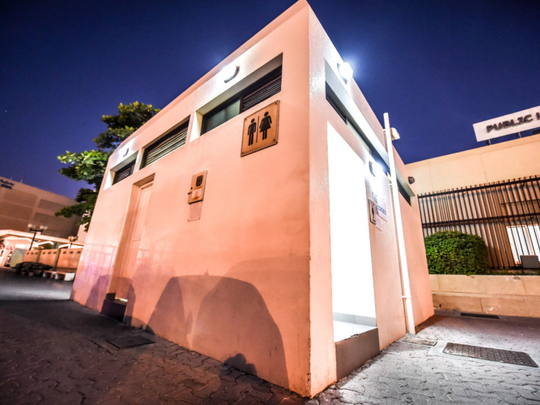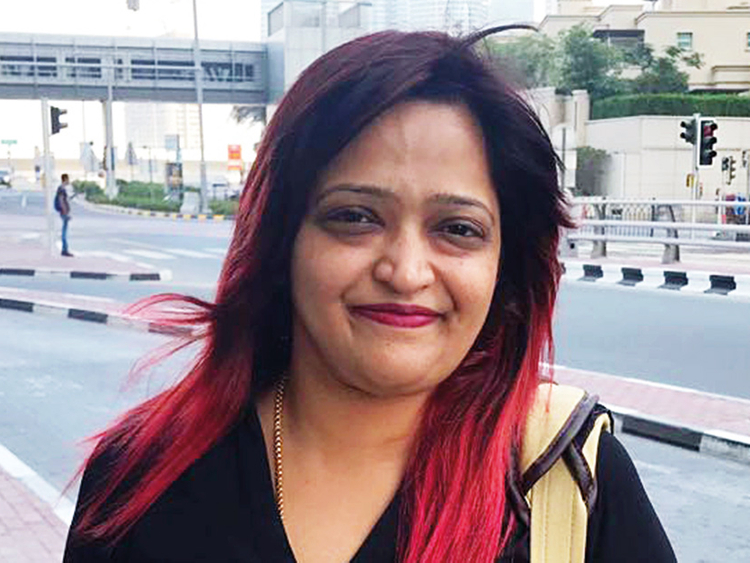
Dubai: There are no pleasant smells at the men’s public toilet at the Al Gubaiba bus station in Bur Dubai.
Inside, ventilation fans stir up putrid air hovering over the urinals and hole-in-the-floor-style squat toilets.
Scrawled in permanent marker on the back of a cubical door with a broken lock, a sinister graffiti is hard to ignore.
Outside, on wooden benches, some sip tea in polystyrene cups, bought for just Dh1 from one of the station’s half a dozen cafeterias.
“There are no tissues,” said Syed, a Pakistani expat. “After when we wash….” Behind him, as seen through the open door, a man raises his legs, one after the other, to wash his feet in the sink.
But for many waiting at the bus terminal — a mix of lower-income workers and the occasional tourist — the toilets are rare islands of relief in a sea of potential discomfort.
“It’s hard,” said Sijo, who describes a severe lack of public toilets in the city. “People maybe are used to going to the mosque, because it’s difficult to find public toilets.”
Being caught short seems to be a regular reality for many across the city. This week, Dubai Municipality rolled out a new campaign that slaps people urinating in the street with Dh500 fines.
Warning
The municipality has plastered nearly 700 warning posters in Arabic, English and Urdu across the city, including in Satwa, Al Sabkha and Naif.
The posters have been put “especially in areas located behind buildings, alleyways, and places next to dilapidated buildings,” Abdul Majeed Saifaie, the municipality’s director of waste management, told Gulf News. People who spit and leave chewing gum in public places face even stricter fines of Dh1,000.
Some complain of similar problems in the capital Abu Dhabi. The issue does not only affect bus commuters.
A shortage of public facilities forces many to slip into restaurants and cafes to heed nature’s call.
Dubai Municipality told Gulf News that it had opened five new public toilets last year in Al Mamzar and Al Shindagha.
The municipality “studies the requirement prior to implementation”, said a spokesman.
“Other areas are in plan and will open accordingly,” the spokesman added.
On Dubai’s roads, meanwhile, motorists have to make do with petrol station rest rooms that are usually in a state of disrepair.
A survey of petrol stations in Dubai and Sharjah by Gulf News in 2013 found that 95 per cent had issues such as missing toilet paper or soap, unclean and wet seats, or faulty hand dryers.
A petrol pump manager said that motorists were to blame. “Many people abuse these services and make a mess in the washrooms.”
However, users can be perhaps be thankful that public rest rooms are free.
In Europe, people often have to pay to use public rest rooms, or buy something at a restaurant or cafe to be handed the keys to the porcelain kingdom.
In the UK, public toilets commonly cost n Dh1 to Dh1.50, according to the British Toilet Association.
One of the country’s most expensive public toilets, in Scotland, costs a whopping Dh4.50 per visit.
Back at the Bur Dubai bus station, Sijo laments the poor condition of the washroom. “I don’t know why they’re kept like this,” he said.
He added that he would be happy to pay to use the toilet — if only the experience was a little more fragrant.
Far on the other side of town, in the Dubai Marina, some residents also noted the lack of public facilities there.
“Yes, there is a shortage,” said Meena, an Indian expat who works with a retail group. “If you are walking, let’s say, for at least 500m to 1km, you will not see a public toilet, unless you go to the mall or get into a metro station.”
Not everyone agrees. “No, not around Dubai Marina,” said Michael, a Danish expat who lives in the area. “I haven’t really faced any shortage problems honestly.”
Another resident noted that most toilets were confined to shopping centres. “We mostly have toilets in malls. Nothing in the streets, for example,” said Ellenie, a Filipina housewife.
But for some, there’s simply no need for public toilets. “I never search for a public toilet, frankly speaking,” said Adel Hajj, a Lebanese architect. “I prefer to use my own toilet, except if I’m at the mall, I’ll sometimes make an exception.”
Should all restaurants and cafes have toilets?
Picture the scene: You take a visiting elderly relative, or somebody who suffers from Irritable Bowel Syndrome, to one of Dubai’s cafe or restaurants.
Then, when nature calls, you find out that the nearest toilet is some distance away.
Rules of Dubai Municipality do not specify that on-site rest rooms should be provided where food or drink is served.
In malls and outdoor shopping areas, toilets are commonly shared between outlets.
In response to a request to whether Dubai Municipality was planning to change its codes on rest rooms, the government body said that some retail areas are “investment areas” and not covered by their jurisdiction.
“However, we will collaborate with the authority concerned and study the matter,” a municipality spokesman said.
In Western countries such as Britain, laws require that toilets should be provided if food and drink is being sold for consumption on the premises. Venues that are open after 11pm or sell alcohol must have toilets.
In practice, this means that sit-down restaurants, cafes and bars have toilets for customers, while takeaway places with few places to sit do not.
In the United States, laws on rest room access vary from state to state.
Many states require that retail establishments that have toilets for staff must allow customers to use the facilities if they have medical conditions.
– With inputs from Sarah Skaf, intern with Gulf News










